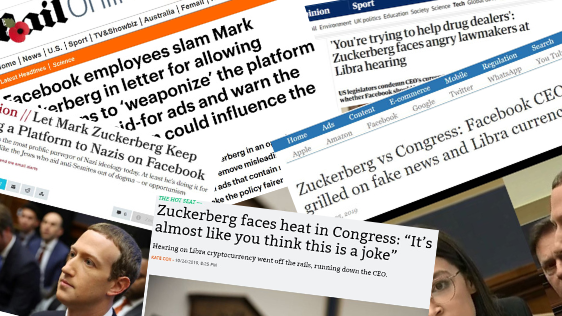T he sight of Mark Zuckerberg facing an aggressive line of questioning from US lawmakers last week was a reminder of the importance of reputation management. This was ‘Zuck’, the tech genius who once wowed the US business scene with his “move fast and break things” ethos. But, from a Pr perspective, his stock has plummeted.
He was trying to convince politicians that his latest move into the world of cryptocurrency was a great idea. But, instead, he was left beleaguered by questions about civil rights and videos of terrorism on his social media platform.
When Facebook was rapidly growing into a multi-billion-dollar business, Zuck was barely questioned about his approach but now he’s challenged at every turn.
What’s changed? Well, there has been a fundamental breakdown in trust – mainly due to Facebook’s well documented issues with data privacy. Facebook is not alone in this PR crisis, however.
Scandals have plagued the tech industry in recent years, and it has shaken faith, not just in Facebook, but across the board. Businesses are now being attacked for everything from their ethics and employment policies to their business models and the impact of the tech itself.
Faith in tech businesses
Any business looking at its own PR now needs to be wary of this ‘techlash’ – and understand how important trust has become when trying to attract the best talent, investors and customers.
A whole heap of hype, buzzwords and promised potential is no longer enough for tech firms. You only need to look at WeWork’s recently failed IPO, to understand why scrutiny is on the rise. People need to be reassured that there is more to the business model than smoke and mirrors.
While WeWork looks as if it will be salvaged through an enormous investment from Softbank (albeit with heavy job losses), there are too many examples of intriguing tech companies turning out to be hollow scams – consider the criminal investigations that followed the fall of Theranos and One Coin.
Trust in the tech
The need to build trust in the technology, as well as in the business, now goes deeper too. The initial naivety that accompanied the rise of social media serves as a good example of why. These platforms seemed innocuous in the early days and people embraced them with great enthusiasm, with barely a thought as to how their privacy could be compromised, how young people may suffer psychological damage, or what potential there was to divide societies. But our attitudes to social media have changed.
As such we are much more wary of emerging technology, especially when it has clear potential to change the world around us, in the way that say AI, automation or facial recognition could.
Take self-driving cars as another example. By taking control away from humans, this technology has the potential to reduce road fatalities and save thousands of lives every year. But as long as we believe autonomous vehicles have the potential to claim even one life, we’re not going to feel comfortable about letting them loose.
Taking responsibility
With the bar of trust raised, companies are now being forced to explain their tech in a clear and compelling manner. If they want to be perceived as responsible, they also need to be ready with the right answers when asked – and demonstrate they have thought through their potential impact on customers and society.
You can already see how attitudes have changed. In what seems like a direct challenge to Mark Zuckerberg – and his call for politicians to be the ones to regulate tech companies – Brad Smith, Microsoft’s president, recently said tech companies can’t absolve themselves of all responsibility. He also said, quite pointedly, that the era of ‘move fast and break things’ was over.
In many respects, this is a calculated PR move from Smith to recapture the trust that tech firms have lost. It’s a move that other tech companies will surely need to follow if they want to convince people to buy into them, the tech they are selling and the story they are telling.
Share this:





